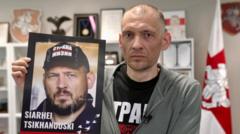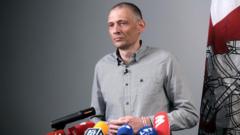Tidjane Thiam, the main opposition leader in Ivory Coast, has been disqualified from the electoral list, jeopardizing his presidential ambitions.
Opposition Leader Tidjane Thiam Disqualified from Ivory Coast Presidential Election

Opposition Leader Tidjane Thiam Disqualified from Ivory Coast Presidential Election
Ivorian judiciary rules Tidjane Thiam ineligible for October election amidst ongoing political tension.
The court's ruling, deemed "an act of democratic vandalism" by Thiam, stems from his past acquisition of French citizenship, which the judiciary argues invalidates his Ivorian nationality. Amidst a backdrop of faltering political opposition and potential candidates for the upcoming election, Thiam’s removal raises serious concerns over the integrity of the electoral process in the country.
In a stunning turn of events, Ivory Coast's judiciary has ruled that Tidjane Thiam, a leading figure in the opposition Democratic Party (PDCI), is ineligible to participate in the upcoming presidential election scheduled for October. The court asserts that Thiam’s acquisition of French citizenship in 1987 effectively stripped him of his Ivorian nationality, a decision that cannot be appealed.
Thiam, who renounced his French citizenship to compete in the presidential race, has vocally condemned the court's decision as an "act of democratic vandalism," claiming it disenfranchises millions of voters who support him. Thiam was previously confirmed as the sole candidate representing the PDCI after a resounding popular vote of 5,321 from 5,348 cast.
The ruling comes on the heels of a tense political climate in Ivory Coast, as the governing RHDP party, led by current president Alassane Ouattara, navigates its own candidate nominations. Ouattara, now 83, is expected to seek a fourth term, while other significant political figures, including former President Laurent Gbagbo, have faced similar disqualifications.
Thiam's reaction to the decision underscores the mounting tension within Ivorian politics. He stated, "It's no surprise that this court ruling comes as our support among voters continues to grow," suggesting that those in power are intimidated by the prospect of losing their hold on authority.
With an impressive academic background and a successful career in international business, Thiam's journey from the political sphere to the corporate world and back again has been marked by significant achievements. His rise through the political ranks began in 1998 as planning minister for the PDCI, a role that was cut short following a coup the following year which ousted the party from power.
As the October elections approach, the road ahead for Ivorian democracy appears complicated, as the exclusion of Thiam, along with others from the electoral process, amplifies concerns over the fairness and legitimacy of upcoming political contests.
In a stunning turn of events, Ivory Coast's judiciary has ruled that Tidjane Thiam, a leading figure in the opposition Democratic Party (PDCI), is ineligible to participate in the upcoming presidential election scheduled for October. The court asserts that Thiam’s acquisition of French citizenship in 1987 effectively stripped him of his Ivorian nationality, a decision that cannot be appealed.
Thiam, who renounced his French citizenship to compete in the presidential race, has vocally condemned the court's decision as an "act of democratic vandalism," claiming it disenfranchises millions of voters who support him. Thiam was previously confirmed as the sole candidate representing the PDCI after a resounding popular vote of 5,321 from 5,348 cast.
The ruling comes on the heels of a tense political climate in Ivory Coast, as the governing RHDP party, led by current president Alassane Ouattara, navigates its own candidate nominations. Ouattara, now 83, is expected to seek a fourth term, while other significant political figures, including former President Laurent Gbagbo, have faced similar disqualifications.
Thiam's reaction to the decision underscores the mounting tension within Ivorian politics. He stated, "It's no surprise that this court ruling comes as our support among voters continues to grow," suggesting that those in power are intimidated by the prospect of losing their hold on authority.
With an impressive academic background and a successful career in international business, Thiam's journey from the political sphere to the corporate world and back again has been marked by significant achievements. His rise through the political ranks began in 1998 as planning minister for the PDCI, a role that was cut short following a coup the following year which ousted the party from power.
As the October elections approach, the road ahead for Ivorian democracy appears complicated, as the exclusion of Thiam, along with others from the electoral process, amplifies concerns over the fairness and legitimacy of upcoming political contests.





















